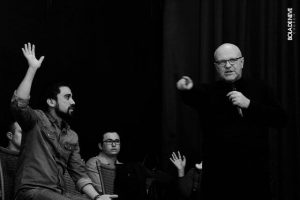
You can recognize Oswald Chamber’s famous “My Utmost for His Highest” in the title, and he meant by that what I mean mine. I apply this idea to the process that produces the ultimate kingdom leader. We live in a power-point moment in which the greatest kingdom leaders of all history should be alive, well, and reaching their ultimate. Here’s what I mean by “My Ultimate for His Priorities.”
Character is Principled Living
Life requires structure. Being “built up” requires having something “built in.”
Character is the stuff of personal leadership. Character is principled living. The Christ-like character is living by principles from Someone above you that arrived from outside you because they are not there naturally.
While our view and opinion on human frailty after the Fall of Adam may vary, and we can argue about the particulars of our fallen natures, the reality that all Truth is God’s Truth and comes into us from outside us is a Biblical presupposition.
“Men are ever learning but never able to come to the knowledge of the Truth.” And, “let God be true and every man a liar.”
All that stands between God and complete human animalism is Providence. God maintains the worst cultures, monsters, and social corruptions because of mercy even when Creation itself makes it clear that man is not the one in charge, that a Creator must be part of natural history, and that the most straightforward move toward the Creator will be met with Divine welcome points to this reality.
We lived in a closed system. All truth is revealed and received, and leads to repentance.
Personal Leadership and Kingdom Leadership
All leadership begins with personal leadership. What you will be and do to influence others must start inside you. You must apply the same principles, processes, and protocols of kingdom culture to your own life before implementing them in leadership relationships and dynamics.
Building personal leaders is the stuff of discipling. The discipling leader is a fathering leader, partnering with and representing the Father. The goal of discipling is measured by how the disciple becomes like the One and ones discipling him. That is, the strength of will the disciple lacks is provided through discipline that comes into him from outside himself from someone above him.
These principles teach us that the key to maturity is submission.
Someone above him refers to submission. Submission is the posture of the disciple. Submission to the Father requires submission to natural fathers: “Honor your father and mother.” Submission to the Father requires submission to spiritual fathers: “Honor to whom honor is due.” And the principle presupposed in this statement: “Honor the prophet as a prophet, and you receive what the prophet was sent to provide you.”
The goal of the Father is the ultimates of the disciple. Father is not producing helpless victims or stumbling survivors. Submission is not a weakness – just the opposite! Submission is the position and posture of strength that builds the ultimate weakness as a means of ultimate power. Ultimate strength is available only where we reach ultimate submission.
Personal Leadership Priorities
So, to reach the ultimate, we become more submissive. We become more submissive with increased trust – that is, faith is the basis of our redemptive restoration.
Here’s how that looks: Father trains us to focus the highest of our lives on the highest of His purposes for our lives. That is the highest level of personal leadership and the basis for the highest levels of kingdom leadership. This is what it means to be broken bread and poured-out wine. This is what it means to become a servant. This is what it means to be the living sacrifice that brings us through the transformation to the good, acceptable and ultimate “what God wants.
You mature as you order your life by God’s priorities at the expense of your priorities. Beware the humanistic idea that you can somehow get yourself or God to agree to some blend of priorities. Submission is not a negotiation posture. It is a sacrificial posture. Submission has “yes” written into its fine print.
Priorities work like this: The purpose of God requires a transformational reordering of my priorities. God does His part with redemptive restoration. That part is miraculous, spiritual, and instantaneously applied in the context of our trusting faith. We are saved by faith. The part we do is requires a process of pathos that trains us for more nearly complete obedience.
Priorities work in direct opposite of the work of hell. The work of hell is “the anything but that” method of distraction that produces substitution. The work of hell is a constant and consistent opposition to the priorities of God in your life. Until you understand this, you do not understand temptation, trial, and test – they are never random or arbitrary but strategic, intentional, and persistent.
There is, on the one hand, your Divine priorities. On the other side is the vicious cycle of temptation, trial, and testing. Father’s discipline and the disciplines of natural and spiritual fathers are designed and defined by the same operational parameters: building up the structure of your soul to more nearly complete obedience.
The mature leader will live with a focus of his highest for God’s priorities. This is a lifelong pursuit. This is the pathway toward becoming the ultimate of who God created you to be and doing what God has called you to do.
